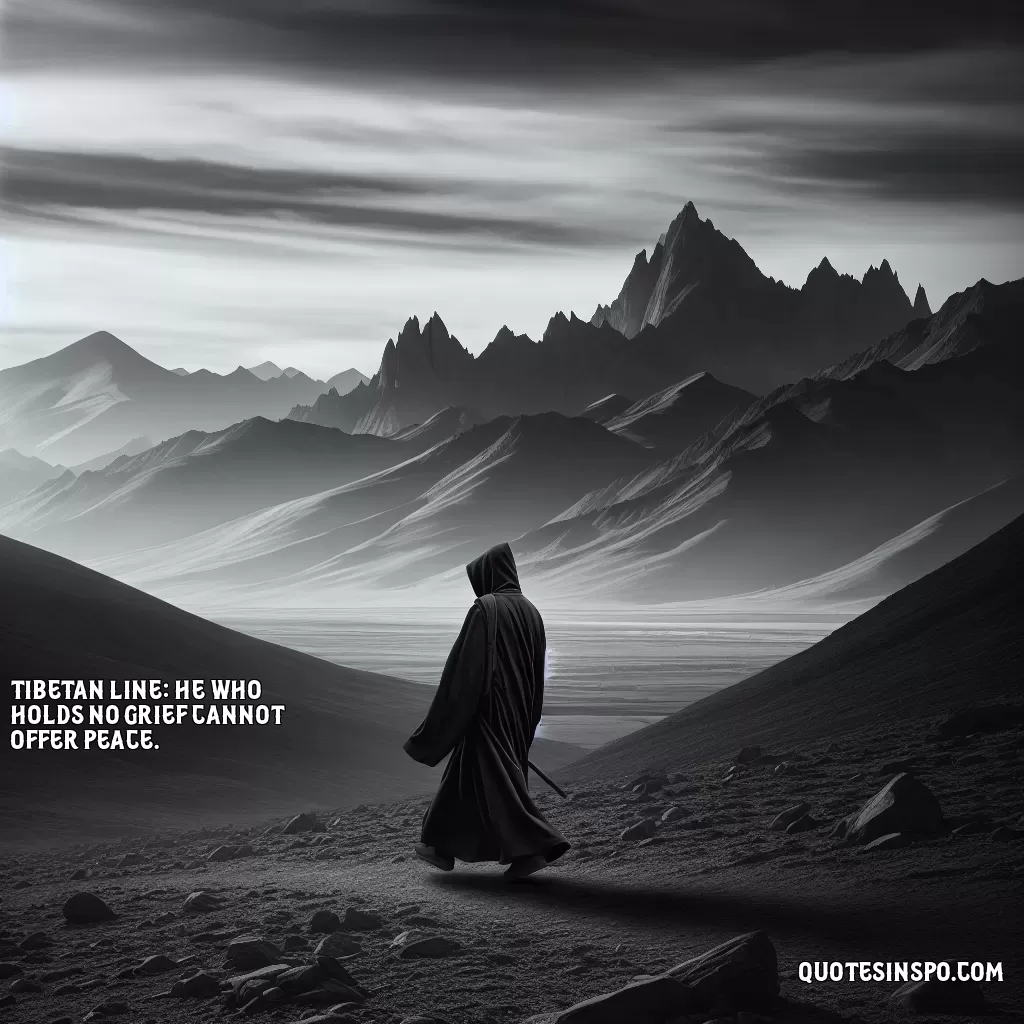
Tibetan Line: He who holds no grief cannot offer peace.

Tibetan Line: He who holds no grief cannot offer peace.
The quote "He who holds no grief cannot offer peace" suggests a profound connection between human emotions and the capacity to bring about peace. It implies that to truly understand and foster peace, one must first have experienced and acknowledged grief. This idea hinges on the notion that grief, or any deep emotional experience of suffering, provides an essential perspective and empathy that are crucial for creating peace. Without having felt grief themselves, a person may lack the depth of understanding and empathy required to fully appreciate the suffering of others or to offer meaningful solace. Grief, then, becomes a teacher—one that informs us of the human condition in a way that intellectual understanding alone cannot. Moreover, experiencing grief can lead to personal growth, a heightened sense of compassion, and an ability to connect with others on a fundamental emotional level. When a person has come to terms with their own grief, they may be more open, patient, and forgiving, qualities that are essential in peacemaking. This personal transformation can radiate outward, allowing them to approach conflicts with a gentle understanding and facilitate reconciliation. In a broader sense, the quote might also suggest that a society or community that collectively acknowledges and integrates its grief may be more capable of achieving lasting peace. Only by addressing and understanding past sufferings can healing occur, paving the way for genuine harmony. Thus, grief is not an impediment but rather a crucial component of the path to peace.
Quote By: Tenzin Gyatso (14th Dalai Lama)
Born on July 6, 1935, in Taktser, Amdo, Tenzin Gyatso is the 14th Dalai Lama and the spiritual leader of Tibetan Buddhism. Recognized as the reincarnation of the 13th Dalai Lama at the tender age of two, Tenzin Gyatso’s life has been a remarkable journey through the challenges of a world profoundly affected by political turmoil and religious conflict.
Tenzin Gyatso was formally enthroned as the Dalai Lama in 1940, at which time he began his monastic studies and engagement with Tibetan culture and education. However, his leadership was soon tested by the political upheaval in Tibet. In 1950, following the invasion of Tibet by Chinese forces, Tenzin Gyatso was thrust into a challenging position as both a spiritual and political leader. In 1959, amid increasing tensions, he fled to India, where he established the Tibetan government-in-exile, securing a new home for thousands of Tibetan refugees and preserving the Tibetan culture.
Throughout his life, Tenzin Gyatso has emphasized the importance of compassion, nonviolence, and interfaith dialogue. He has traveled extensively around the globe, advocating for peace and human rights, and has been awarded numerous accolades for his tireless efforts, including the Nobel Peace Prize in 1989. His teachings draw from the rich traditions of Tibetan Buddhism, yet they resonate widely with universal themes of kindness and understanding.
In addition to his advocacy work, Tenzin Gyatso is an accomplished author, having written over 100 books on topics ranging from spirituality to science. His notable works include "The Art of Happiness" and "The Wisdom of Compassion," where he explores how to lead a fulfilling life while facing adversity. Tenzin Gyatso continues to inspire millions around the world, encouraging individuals to cultivate inner peace and compassion in a challenging world.
As he enters the later years of his life, Tenzin Gyatso's legacy as a spiritual leader and peace advocate remains significant, marking him as a pivotal figure of the 21st century whose teachings continue to enlighten and guide humanity towards a path of harmony and understanding.